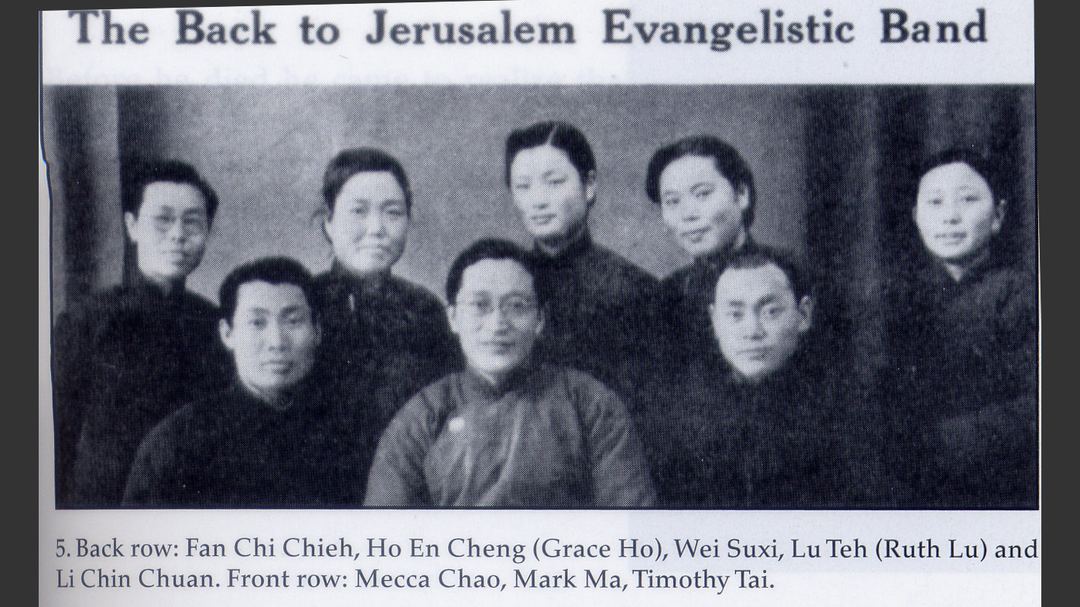

Every great revival begets a great missionary vision. The great revival in China in recent decades has been accompanied by a renewed vision, broadly known by names such as the Back to Jerusalem Movement and Mission China 2030. The vision is to take the gospel to China’s minority peoples and the unreached peoples of Southeast, Central and West Asia, a vision that traces its genesis back to the 1940s. All told in that decade, God raised up five separate groups of Chinese Christians with the vision of reaching Muslims in western China and beyond.
On Easter Sunday, April 25, 1943, eleven Christians at the Northwest Bible Institute in Fengxiang, Shaanxi shared with one another how the Lord had called each to take the gospel to Xinjiang. A month later, under the leadership of Vice-Principal Mark Ma Peixuan (马培萱牧师), the group adopted a Chinese name from Matthew 24:14 that literally meant the Preach the Gospel Everywhere Band (中国基督徒遍传福音团). However, they came to be known in English by the name used by their missionary colleagues, the Back to Jerusalem Evangelistic Band.
In March 1947, six members of the group left Fengxiang for the long journey to Xinjiang. The six included one man (Moses Zhang Moxi-张摩西弟兄) and five women (Fan Zhijie-樊志介姊妹, Lu De-路得姊妹, Wei Suxi-韦苏西姊妹, Grace He Enzheng-何恩证姊妹, and Li Jinquan-李近泉姊妹). Li Jinquan actually came from a Muslim family. She first heard the gospel when she was 20, and after receiving Christ as Savior, she enrolled in the Northwest Bible Institute in 1941. He Enzheng, in contrast, had been born into a Christian family in Tianjin in 1920. Her parents pasted the names of places like Jerusalem, Bethany and Mt. Zion in their courtyard.
The group first traveled 300 miles to Xining, the capital of Qinghai. There they joined a seventh member, Mecca Zhao Maijia (赵麦加弟兄), who had arrived the previous summer. They finally reached Ürümqi in September 1948, and then Zhao and He continued southward to Kashgar. As the church across China came under ferocious attack after the Communist Party took power in 1949, the Band’s evangelistic work largely stalled.
Shandong’s Jesus Family was among the other groups of Chinese Christians called by God to take the gospel across China in the 1940s. They sent out 20,000 missionaries in over 100 teams. An offshoot, the Northwest Spiritual Movement, sent three teams to Xinjiang. Every member of these three teams spent time in prison after the Communist takeover, and only one team leader, Simon Zhao Ximen (赵西门弟兄), survived prison. He and his wife, Wen Muling (文沐灵姊妹), arrived in Xinjiang in 1949 after walking most of the way from eastern China. They had been married less than a year when they were arrested in January 1950. Simon saw Muling through iron bars twice shortly after their arrest and then never again on this earth. She was at that time pregnant with their first child, but miscarried and died in prison in 1959. Simon endured years of beatings and other torture before his release in 1981.
In God’s perfect time, Simon was used to renew the Back to Jerusalem vision of the Chinese Church. When news spread of his release, Xu Yongling (徐永玲姊妹), a prominent Henan Christian woman, traveled to Xinjiang to meet him. She persuaded him, known to them as Uncle Simon, to make the long journey to Henan to share the Back to Jerusalem vision with the younger generation of house church leaders. The vision was caught, and may God be glorified by the Chinese Christians now devoted to the fulfillment of the Great Commission in China and beyond.
Zhao Maijia went to be with the Lord on Mar. 7, 2007. His wife, He Enzheng, the last surviving female member of the Band, ministered to Muslims in Xinjiang until she followed her husband to heaven on January 16, 2014 at age 97. Moses Zhang, the last Band member, lived most of his life in Henan before joining them at age 93 on January 3, 2017.